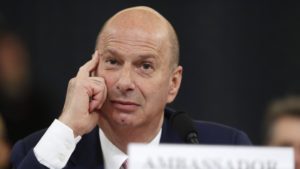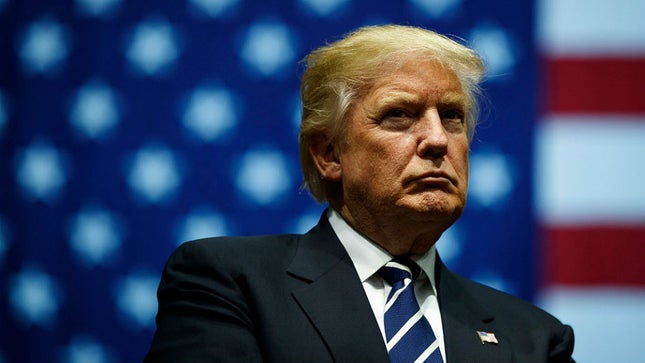December 18, 2019 never appeared to be a very critical or memorable day. Now, however, it will go down in infamy as the day the forty-fifth President of the United States, Donald J Trump, was impeached by the House of Representatives.
The House passed two articles of impeachment against the President on the evening of December 18: one for obstruction of Congress and the other for abuse of power. The first article, abuse of power, passed with 230 yeas to 197 nays and one present vote by Democratic presidential candidate, Tulsi Gabbard (D-HI). The second article, obstruction of Congress, passed with 229 yeas and 198 nays with Gabbard voting presents again.
After hours of representatives giving short speeches earlier in the day, this vote not only marked the end of a long and grueling impeachment process but also marked a pivotal historical event that sets important historical precedent.
Why Trump was Impeached
From transcripts to committee testimony, many moving parts and actions contributed to the decision to impeach the President. The core of this whole process links back to July 25 of this year when President Trump spoke over the phone with Ukrainian President Zelensky. During the call, in which the two men talked about Ukrainian corruption, Trump brought up Joe Biden’s son, Hunter, who was on the board of a Ukrainian energy company, Burisma. Burisma has a history of corruption, and Hunter Biden’s placement on the board without any experience in energy while his father, the then Vice President, was overseeing Ukraine seemed to draw questioning from some, including Trump.

Regardless, the Democrats in the House called foul, citing that the President was using his position to dig up political dirt on an opponent one year out from an election. Not only that, but Trump also got into hot water for postponing a White House meeting with Ukraine until an investigation into the Biden’s was launched, creating a quid pro quo scenario. US Ambassador to the European Union Gordon Sondland said in his testimony when asked if there was a quid pro quo, “with regards to the requested White House call and the White House meeting, the answer is yes” (CNN).
Furthermore, the House also attacked Trump for threatening to withhold money from Ukraine until an investigation was launched into his political opponents. Not only was the President engaging in what many see as bribery, but he also was soliciting a foreign power in a US election. For these reasons, the House charged the President with abuse of power.
The House also charged Trump with obstruction of Congress for Trump’s ordering of top-level officials inside the White House to not testify before Congress even though they had issued lawful subpoenas. House Intelligence Committee chairman and California representative Adam Schiff commented, “I think [obstruction of Congress] is the most serious of the articles because it would fundamentally alter the balance of power and allow for much greater misconduct in the chief executive of the country” (The Hill).
Flaws in the Case on Both Sides
While impeachment is supposed to be a bipartisan process, this impeachment certainly was everything but that. From the almost entirely party-line vote to the passionate words said on the House floor, the Democrats and Republicans were harshly divided on the issue.
The Republicans presented the case that Trump was innocent and that the entire process was a sham. Part of their argument was that Ukraine did get the aid in question and also that Zelensky, at the time of the call, was unaware of any possible quid pro quo. However, as Representative Adam Schiff addressed, just because everything turned out okay does not vindicate the original intent of the President to use the aid as leverage. Also, Republican lawmakers made repeated claims which were factually incorrect: Rep. Doug Collins (R-GA) criticized the lack of GOP witnesses even though one in four witnesses were called by the GOP House committee members, Republican House members cite that there was never a quid pro quo despite testimony by Sondland and others, and Republicans argued Ukraine meddled in the 2016 election despite US intelligence finding no evidence of such claim, to name a few.
The Democrats also had their fair share of suspicious actions. For one, the Democrats swiftly shifted their focus from a “quid pro quo” to “bribery” during the impeachment inquiry. This came after the Democratic Congressional Campaign Committee conducted studies through focus groups to determine which charge created the most outcry from voters. Many have pointed to this as evidence that the impeachment is a political endeavor, shifting the focus to what is most appealing. Democrats also tried to paint the entire impeachment process as a solemn and sorrowful event; however, House Speaker Nancy Pelosi (D-CA) had to silence her Democratic colleagues after gaveling in the first article, showing their sorrow isn’t wholly genuine and political disdain likely is playing a role.
An Expert’s Opinion
Dr. Tracy McFarland, an AP government teacher and Ph.D. in Political Science and Government, commented on the significance of impeachment and also how it will affect the future of American politics:
“While much of the coverage about House Articles of Impeachment and the Senate trial focuses on Dems or GOP political calculations, from my perspective as a political scientist, this impeachment is about institutions. In political science, we talk about institutions in terms of rules and norms of government. Impeachment is a part of the separation of powers as an institution, The framers of the constitution did intend to have a way to hold a president (and other officials) accountable beyond elections. It was definitively NOT designed to be strictly about crimes as they were defined at the writing of the constitution (as I like to share with my classes, a misdemeanor is when y’all jaywalk across Inwood, likely not what the Framers meant). In this case, the facts do not seem to be contested by either side; rather, the debate centers on the interpretation of those facts; that’s the political part.”
“As people who live here, whether you can vote or not, seeking information for yourself, including reading direct testimony, is the only way for you to make up your mind about whether the institution of SOP means that the president should not obstruct Congress’ investigations (which is the second impeachment article) into whether withholding aid was for personal political gain OR whether those same actions (of withholding testimony and documents from Congress or withholding aid from Ukraine) simply constitute legitimate executive actions. And, although this has been characterized as Dems v GOP, there are conservative voices (and not just Never-Trumpers) who have called for his removal, Christianity Today, an evangelical publication, as well as The American Conservative.
In my mind, this highlights that the soundbites or social media feed aren’t sufficient for people to make up their minds.
Trump’s future is a little less clear. There’s not a way, in my view, to predict properly how this will affect the election. There’s no Dem candidate yet; no clarity on the trial, rules, witnesses, etc. that could add information; and there is information coming out daily that supplements what has already been gathered. Just last Friday, for example, the Pentagon released emails made public under Freedom of Information Act request (FOIA) that detail that Ukraine’s aid was frozen by OMG 90 minutes after the July phone call. This may mean nothing but does highlight that the events surrounding all of this continue to evolve.”
If the Senate does convict, Trump could also be barred from running for office again OR not. There’s a great article from Newsweek outlining this set of options for the Senate.”
Dr. McFarland also listed the below articles as useful resources for those who would like to learn more about the process:
Disclaimer: Some of these links might require a login or subscription to view.
What Comes Next?
As most Americans should know, just because Trump has now been impeached does not mean he is out of office. Speaker Pelosi must send the articles to the Senate, where the impeachment trial will occur. Only then if two-thirds of the Senators find the President guilty of the impeachment charges will Trump be removed from office.
Almost directly after the articles passed the House, Pelosi voiced concern about sending the articles to the Senate because she fears the trial will not be fair. The Senate, which is controlled by the Republicans, has made it clear that they want the trial to be swift. Senate Majority Leader Mitch McConnell (R-KY) initially stated that the Senate will not call any further witnesses, and McConnell also rejected Senate Minority Leader Chuck Schumer’s (D-NY) proposal for the Senate impeachment trial.

The way McConnell plans to execute the trial has raised concerns from many people, for he has also stated that he will work closely with the White House on how the trial will take place. Some senators such as McConnell and Lindsey Graham (R-SC) have also explicitly stated they will not act as impartial jurors, an explicit contradiction of how the senators are supposed to act in an impeachment trial.
However, others see the Democratic side as hypocritical for not sending over the articles to the Senate. Some argue that the Senate acting in a partisan manner is simply reciprocating how the process worked in the House.
Regardless, as of now, the articles stay in the House, the Senate prepares for a trial, and Trump stays in office.
Stay tuned to The Roundup for more on US Politics and Impeachment!






